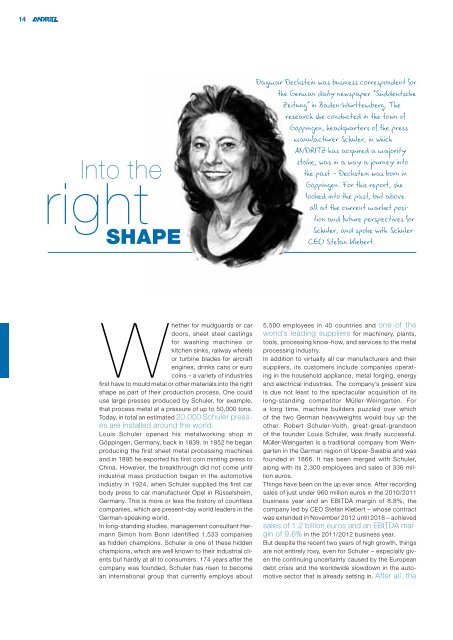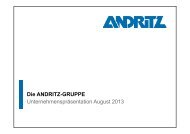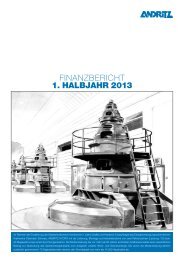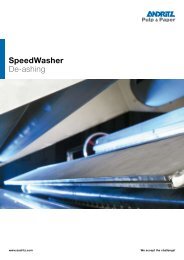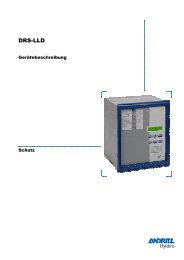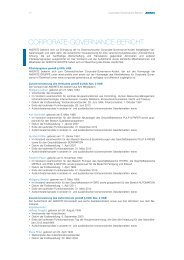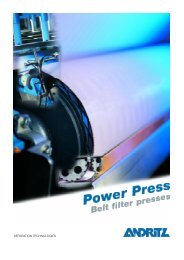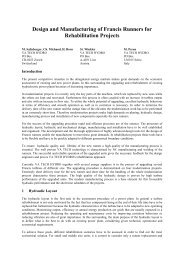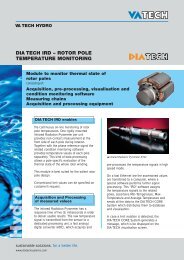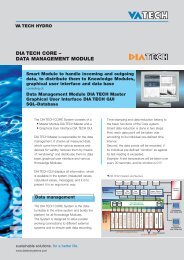ANDRITZ annual report 2012 - ANDRITZ Vertical volute pumps
ANDRITZ annual report 2012 - ANDRITZ Vertical volute pumps
ANDRITZ annual report 2012 - ANDRITZ Vertical volute pumps
You also want an ePaper? Increase the reach of your titles
YUMPU automatically turns print PDFs into web optimized ePapers that Google loves.
14<br />
Into the<br />
right<br />
shape<br />
Dagmar Deckstein was business correspondent for<br />
the German daily newspaper “Süddeutsche<br />
Zeitung” in Baden-Württemberg. The<br />
research she conducted in the town of<br />
Göppingen, headquarters of the press<br />
manufacturer Schuler, in which<br />
<strong>ANDRITZ</strong> has acquired a majority<br />
stake, was in a way a journey into<br />
the past — Deckstein was born in<br />
Göppingen. For this <strong>report</strong>, she<br />
looked into the past, but above<br />
all at the current market position<br />
and future perspectives for<br />
Schuler, and spoke with Schuler<br />
CEO Stefan Klebert.<br />
W<br />
hether for mudguards or car<br />
doors, sheet steel castings<br />
for washing machines or<br />
kitchen sinks, railway wheels<br />
or turbine blades for aircraft<br />
engines, drinks cans or euro<br />
coins – a variety of industries<br />
first have to mould metal or other materials into the right<br />
shape as part of their production process. One could<br />
use large presses produced by Schuler, for example,<br />
that process metal at a pressure of up to 50,000 tons.<br />
Today, in total an estimated 20,000 Schuler presses<br />
are installed around the world.<br />
Louis Schuler opened his metalworking shop in<br />
Göppingen, Germany, back in 1839. In 1852 he began<br />
producing the first sheet metal processing machines<br />
and in 1895 he exported his first coin minting press to<br />
China. However, the breakthrough did not come until<br />
industrial mass production began in the automotive<br />
industry in 1924, when Schuler supplied the first car<br />
body press to car manufacturer Opel in Rüsselsheim,<br />
Germany. This is more or less the history of countless<br />
companies, which are present-day world leaders in the<br />
German-speaking world.<br />
In long-standing studies, management consultant Hermann<br />
Simon from Bonn identified 1,533 companies<br />
as hidden champions. Schuler is one of these hidden<br />
champions, which are well known to their industrial clients<br />
but hardly at all to consumers. 174 years after the<br />
company was founded, Schuler has risen to become<br />
an international group that currently employs about<br />
5,500 employees in 40 countries and one of the<br />
world’s leading suppliers for machinery, plants,<br />
tools, processing know-how, and services to the metal<br />
processing industry.<br />
In addition to virtually all car manufacturers and their<br />
suppliers, its customers include companies operating<br />
in the household appliance, metal forging, energy<br />
and electrical industries. The company’s present size<br />
is due not least to the spectacular acquisition of its<br />
long-standing competitor Müller-Weingarten. For<br />
a long time, machine builders puzzled over which<br />
of the two German heavyweights would buy up the<br />
other. Robert Schuler-Voith, great-great-grandson<br />
of the founder Louis Schuler, was finally successful.<br />
Müller-Weingarten is a traditional company from Weingarten<br />
in the German region of Upper-Swabia and was<br />
founded in 1866. It has been merged with Schuler,<br />
along with its 2,300 employees and sales of 336 million<br />
euros.<br />
Things have been on the up ever since. After recording<br />
sales of just under 960 million euros in the 2010/2011<br />
business year and an EBITDA margin of 8.8%, the<br />
company led by CEO Stefan Klebert – whose contract<br />
was extended in November <strong>2012</strong> until 2018 – achieved<br />
sales of 1.2 billion euros and an EBITDA margin<br />
of 9.6% in the 2011/<strong>2012</strong> business year.<br />
But despite the recent two years of high growth, things<br />
are not entirely rosy, even for Schuler – especially given<br />
the continuing uncertainty caused by the European<br />
debt crisis and the worldwide slowdown in the automotive<br />
sector that is already setting in. After all, the


